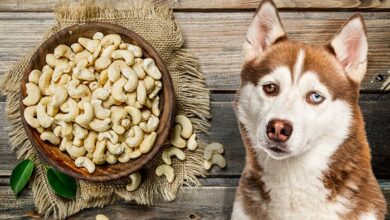Can Dogs Eat Acorns? A Comprehensive Guide for Dog Owners-2025

Can Dogs Eat Acorns? Acorns are nuts produced by oak trees and can commonly be found in parks, forests, and yards. They are small, round or oval-shaped, and tend to scatter around areas with oak trees, especially during the fall.
Dogs may come across acorns while out on walks, during playtime, or even in your own backyard. While these nuts might seem like just another object for your dog to explore, it’s important to know that they can pose potential risks. In this article, we’ll discuss why acorns can be harmful and how to keep your dog safe from these seemingly innocent nuts. Let’s briefly discuss that- Can Dogs Eat Acorns?
Can Dogs Eat Acorns?
No, acorns are not safe for dogs to eat. While these small, crunchy nuts might seem harmless, they contain compounds that can be harmful. Acorns are especially risky for dogs due to their tannin content, which can cause serious health issues. The danger increases if the acorns are moldy or if a dog swallows them in large quantities or whole.
Why Acorns Are Dangerous for Dogs
Toxic Tannins:
- Tannins are chemicals found in acorns that are toxic to dogs. When ingested, they can irritate the stomach and cause symptoms like vomiting, diarrhea, and abdominal pain. In large amounts, tannins can affect a dog’s liver and kidneys, leading to more severe conditions.
Choking and Digestive Blockages:
- Acorns, especially whole ones, pose a choking hazard for dogs. Smaller dogs are particularly vulnerable. If swallowed, acorns can also create blockages in the digestive tract, which can lead to discomfort, pain, and even require medical intervention.
Moldy Acorns and Mycotoxins:
- Moldy acorns pose an even greater risk because they can harbor mycotoxins, which are extremely harmful to dogs. These toxins can cause poisoning symptoms, including lethargy, excessive drooling, and loss of appetite. In severe cases, they can lead to long-term organ damage or even be fatal.
Health Risks of Eating Acorns
Gastrointestinal Issues:
- The tannins in acorns can cause vomiting, diarrhea, and stomach cramps. These symptoms can range from mild to severe depending on how many acorns your dog has eaten.
Potential Blockages:
- Acorns can be tough for dogs to digest, especially if they are swallowed whole. This can lead to blockages in the stomach or intestines, which might require veterinary attention and even surgery.
Kidney and Liver Damage:
- Long-term exposure to tannins, especially in large quantities, can affect the liver and kidneys. If a dog consumes acorns regularly or in large amounts, it may lead to chronic issues or failure in these organs.
How to Keep Your Dog Safe From Acorns
Regularly Clean Outdoor Areas:
- Keep your yard or any outdoor spaces clear of fallen acorns. This reduces the risk of your dog finding and eating them.
Leash Walks in High-Risk Areas:
- During the fall, when acorns are abundant, avoid walking your dog in areas near oak trees. If you do go, keep your dog on a leash to prevent them from scavenging.
Training Commands:
- Teach your dog basic commands like “leave it” or “drop it.” This can help prevent them from picking up and eating harmful items during walks or playtime.
Use Barriers or Deterrents:
- If you live in an area with oak trees, consider using barriers or deterrents in your yard to keep your dog away from acorn-filled areas.
Can Dogs Eat Acorns? Acorns are not safe for dogs to eat and can cause a range of health issues, from mild digestive upset to more serious risks like blockages or organ damage. If your dog eats acorns, monitor them closely and consult your vet for advice. By keeping acorns out of reach and training your dog to avoid them, you can protect your dog from the dangers they pose.
Why Are Acorns Dangerous for Dogs?
Can Dogs Eat Acorns? Acorns may seem harmless, but they are far from safe for dogs. These small nuts can cause a variety of health issues due to their natural chemical compounds and physical characteristics. Here’s a breakdown of why acorns should be kept away from dogs.
1. Contain Harmful Tannins
Acorns contain tannins, a type of naturally occurring compound that can be toxic to dogs.
- Stomach Irritation: Tannins can cause stomach upset, leading to symptoms like vomiting, diarrhea, and abdominal pain.
- Toxicity: If consumed in large amounts, tannins can cause more severe toxicity, potentially damaging a dog’s liver and kidneys.
2. Choking Hazard and Digestive Damage
Acorns, especially when broken or chewed, can pose a physical risk to dogs.
- Choking Hazard: Whole acorns can easily get lodged in a dog’s throat, causing choking, especially in small dogs.
- Internal Injury: Sharp pieces of broken acorns can puncture or tear the digestive tract, leading to pain, bleeding, or more severe injuries that may require veterinary care.
3. Moldy Acorns and Mycotoxins
When acorns are left on the ground for extended periods, they can grow mold. This makes them even more dangerous for dogs.
- Mycotoxins: Moldy acorns can contain harmful mycotoxins, which are toxic to dogs and can cause severe poisoning.
- Symptoms of Poisoning: Mycotoxins can cause lethargy, drooling, loss of appetite, and, in severe cases, organ failure.
Can Dogs Eat Acorns? Acorns pose a real threat to your dog’s health. By understanding why they’re dangerous, you can take steps to prevent your dog from ingesting them. Keep an eye on your surroundings and educate yourself on the risks of acorns to ensure your pet stays safe.
Symptoms of Acorn Poisoning in Dogs
Can Dogs Eat Acorns? If your dog has eaten acorns, it’s important to watch for symptoms of poisoning. Acorn ingestion can lead to a range of health issues, from mild stomach upset to severe organ damage. Here’s what to look out for:
1. Gastrointestinal Upset
- Vomiting: Your dog may vomit due to irritation in the stomach.
- Diarrhea: Acorn ingestion can lead to diarrhea, sometimes with traces of blood.
- Loss of Appetite: Dogs may refuse food due to discomfort in their digestive system.
2. Lethargy and Weakness
- Tiredness: Your dog may seem unusually tired or weak.
- Difficulty Walking: Weakness may cause your dog to have trouble walking or standing.
- Unresponsiveness: Your dog may not respond to you as usual, appearing lethargic or disoriented.
3. Signs of Abdominal Pain
- Whining or Restlessness: Dogs in pain may whine or pace restlessly.
- Tender Belly: Your dog may show signs of discomfort if their stomach is touched, such as growling or moving away from you.
- Tense Abdomen: A bloated or tense abdomen could indicate internal distress.
4. Severe Symptoms (in Extreme Cases)
- Kidney Damage: In severe poisoning cases, acorns can lead to kidney failure, which might be evident through excessive thirst or urination.
- Organ Failure: In the most serious situations, acorn toxicity can cause damage to vital organs, leading to symptoms like confusion, rapid breathing, or collapse.
Can Dogs Eat Acorns? If you notice any of these symptoms after your dog eats acorns, seek veterinary care immediately. The earlier you get help, the better the chances for a full recovery.
What to Do If Your Dog Eats Acorns
Can Dogs Eat Acorns? If your dog has ingested acorns, it’s essential to act quickly to minimize any potential harm. Here’s a step-by-step guide to help you handle the situation:
1. Remove Remaining Acorns
- Clear the Area: Immediately remove any acorns from your dog’s surroundings to prevent further ingestion.
- Check for Other Hazards: Inspect the area for any other potential dangers like moldy acorns, which can be more harmful.
2. Observe for Symptoms
- Watch for Signs of Poisoning: Keep an eye on your dog for symptoms such as vomiting, diarrhea, lethargy, or abdominal pain.
- Note Any Changes in Behavior: Any unusual behavior, like weakness or difficulty walking, should be recorded.
3. Contact Your Veterinarian
- Call for Professional Guidance: Get in touch with your vet as soon as possible for expert advice. If you’re unsure whether your dog has eaten acorns, it’s always best to err on the side of caution.
- Provide Detailed Information: Be ready to explain how many acorns your dog has eaten, when it happened, and any symptoms you’re observing.
4. Follow Your Vet’s Advice
- Follow the Plan: Your vet may recommend monitoring your dog at home or bringing them in for treatment, such as administering activated charcoal or providing IV fluids.
- Possible Tests or Treatments: In severe cases, your vet may suggest tests to check for toxicity or damage to your dog’s organs and provide supportive treatments to aid recovery.
Acting quickly can make all the difference when your dog eats acorns. The sooner you respond, the better the chances of preventing serious health complications. Always consult your vet for guidance and support.
Tips for Preventing Acorn Ingestion
Preventing your dog from eating acorns is the best way to ensure their safety during the fall season. Here are some practical tips to help keep your dog away from acorns:
1. Regularly Clear Acorns from Your Yard
- Stay on Top of Fall Cleanup: Acorns often fall in abundance during the autumn months. Make sure to clean up your yard regularly to remove any fallen acorns and other debris that could tempt your dog.
- Inspect Outdoor Areas: Check your dog’s favorite play areas, including parks and walking paths, for acorns that may have gathered.
2. Leash Your Dog Around Oak Trees
- Prevent Scavenging: In areas with oak trees, keep your dog on a leash to limit their ability to sniff out and eat acorns. This is especially important in wooded areas or parks during acorn season.
- Avoid Risky Zones: If you’re walking in an area known for heavy oak coverage, consider avoiding it during the acorn-falling months to reduce your dog’s exposure.
3. Train Your Dog with Commands
- Use “Leave It” or “Drop It”: Training your dog to respond to commands like “leave it” or “drop it” can be extremely helpful in preventing them from eating things they shouldn’t. Practice these commands regularly to reinforce the behavior.
- Reward Positive Behavior: Praise and reward your dog when they successfully avoid or drop acorns or other dangerous objects.
4. Provide Safe Chew Toys and Snacks
- Offer Chew Alternatives: Satisfy your dog’s chewing instincts with safe chew toys. This helps keep them busy and distracted from potentially harmful items like acorns.
- Healthy Snacks: Offer dog-friendly snacks like carrot sticks or apple slices (without seeds) to keep your dog entertained and discourage them from scavenging acorns.
By taking these proactive steps, you can help protect your dog from the dangers of acorns. Regular monitoring and training will ensure your dog stays safe and healthy during acorn season.




